Responsible Leadership in Hospitality Industry
VerifiedAdded on 2023/06/03
|9
|3070
|444
AI Summary
The paper highlights the development of the role of responsible leaders in the hospitality industry and their impact on the organizational culture of an organization. It also discusses the impact of efficient skills of leadership management on Human Resource Management.
Contribute Materials
Your contribution can guide someone’s learning journey. Share your
documents today.
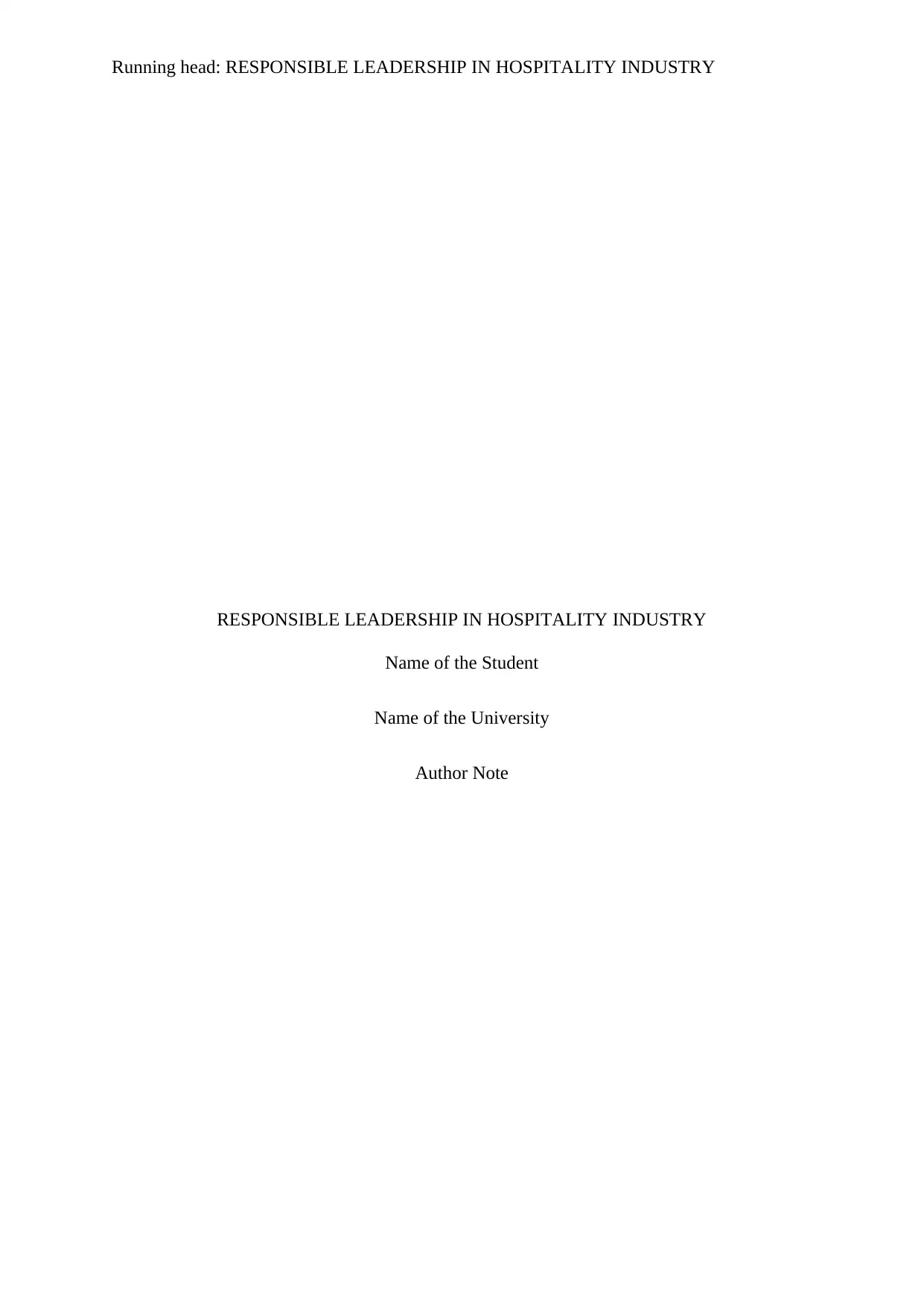
Running head: RESPONSIBLE LEADERSHIP IN HOSPITALITY INDUSTRY
RESPONSIBLE LEADERSHIP IN HOSPITALITY INDUSTRY
Name of the Student
Name of the University
Author Note
RESPONSIBLE LEADERSHIP IN HOSPITALITY INDUSTRY
Name of the Student
Name of the University
Author Note
Secure Best Marks with AI Grader
Need help grading? Try our AI Grader for instant feedback on your assignments.
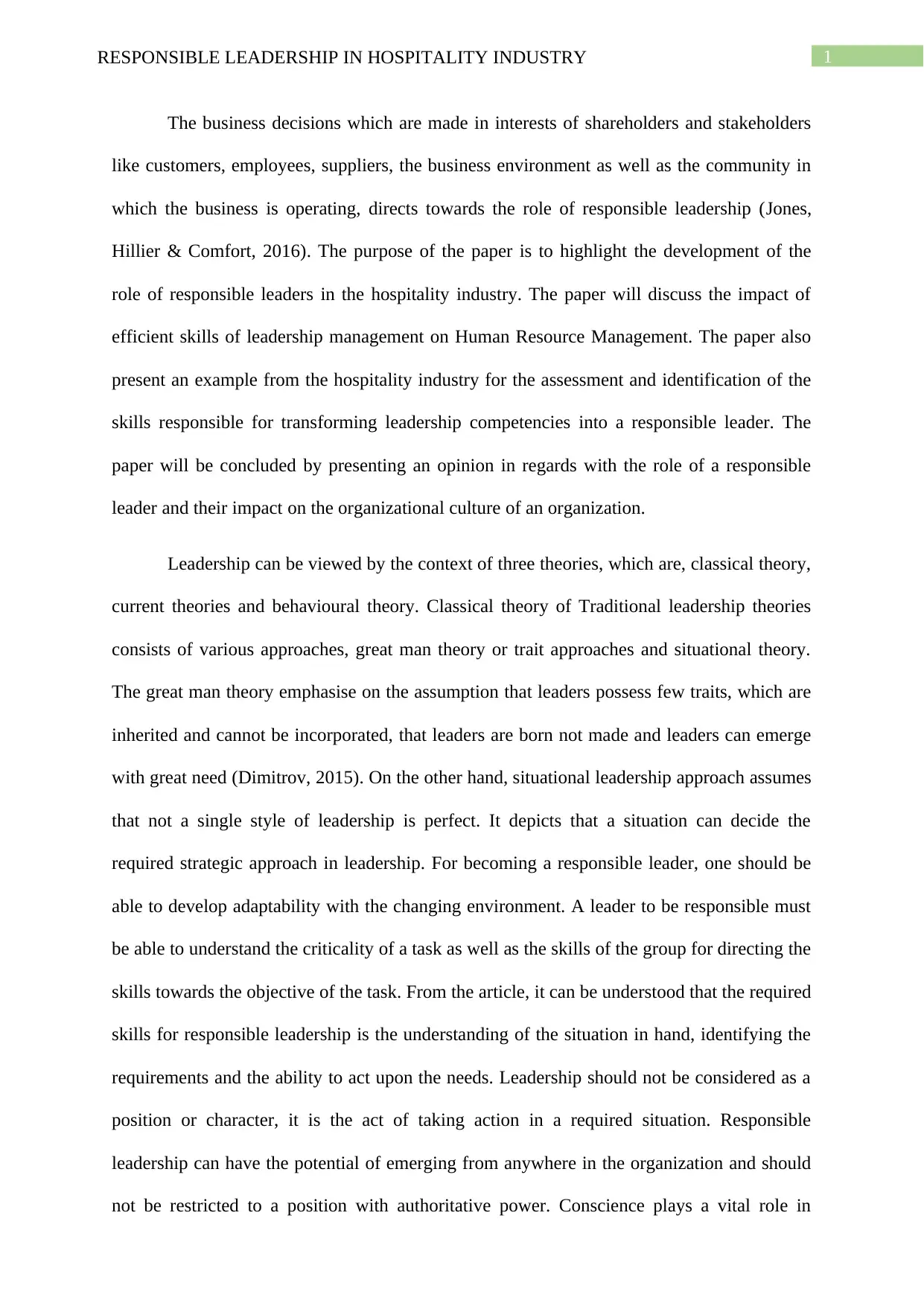
1RESPONSIBLE LEADERSHIP IN HOSPITALITY INDUSTRY
The business decisions which are made in interests of shareholders and stakeholders
like customers, employees, suppliers, the business environment as well as the community in
which the business is operating, directs towards the role of responsible leadership (Jones,
Hillier & Comfort, 2016). The purpose of the paper is to highlight the development of the
role of responsible leaders in the hospitality industry. The paper will discuss the impact of
efficient skills of leadership management on Human Resource Management. The paper also
present an example from the hospitality industry for the assessment and identification of the
skills responsible for transforming leadership competencies into a responsible leader. The
paper will be concluded by presenting an opinion in regards with the role of a responsible
leader and their impact on the organizational culture of an organization.
Leadership can be viewed by the context of three theories, which are, classical theory,
current theories and behavioural theory. Classical theory of Traditional leadership theories
consists of various approaches, great man theory or trait approaches and situational theory.
The great man theory emphasise on the assumption that leaders possess few traits, which are
inherited and cannot be incorporated, that leaders are born not made and leaders can emerge
with great need (Dimitrov, 2015). On the other hand, situational leadership approach assumes
that not a single style of leadership is perfect. It depicts that a situation can decide the
required strategic approach in leadership. For becoming a responsible leader, one should be
able to develop adaptability with the changing environment. A leader to be responsible must
be able to understand the criticality of a task as well as the skills of the group for directing the
skills towards the objective of the task. From the article, it can be understood that the required
skills for responsible leadership is the understanding of the situation in hand, identifying the
requirements and the ability to act upon the needs. Leadership should not be considered as a
position or character, it is the act of taking action in a required situation. Responsible
leadership can have the potential of emerging from anywhere in the organization and should
not be restricted to a position with authoritative power. Conscience plays a vital role in
The business decisions which are made in interests of shareholders and stakeholders
like customers, employees, suppliers, the business environment as well as the community in
which the business is operating, directs towards the role of responsible leadership (Jones,
Hillier & Comfort, 2016). The purpose of the paper is to highlight the development of the
role of responsible leaders in the hospitality industry. The paper will discuss the impact of
efficient skills of leadership management on Human Resource Management. The paper also
present an example from the hospitality industry for the assessment and identification of the
skills responsible for transforming leadership competencies into a responsible leader. The
paper will be concluded by presenting an opinion in regards with the role of a responsible
leader and their impact on the organizational culture of an organization.
Leadership can be viewed by the context of three theories, which are, classical theory,
current theories and behavioural theory. Classical theory of Traditional leadership theories
consists of various approaches, great man theory or trait approaches and situational theory.
The great man theory emphasise on the assumption that leaders possess few traits, which are
inherited and cannot be incorporated, that leaders are born not made and leaders can emerge
with great need (Dimitrov, 2015). On the other hand, situational leadership approach assumes
that not a single style of leadership is perfect. It depicts that a situation can decide the
required strategic approach in leadership. For becoming a responsible leader, one should be
able to develop adaptability with the changing environment. A leader to be responsible must
be able to understand the criticality of a task as well as the skills of the group for directing the
skills towards the objective of the task. From the article, it can be understood that the required
skills for responsible leadership is the understanding of the situation in hand, identifying the
requirements and the ability to act upon the needs. Leadership should not be considered as a
position or character, it is the act of taking action in a required situation. Responsible
leadership can have the potential of emerging from anywhere in the organization and should
not be restricted to a position with authoritative power. Conscience plays a vital role in
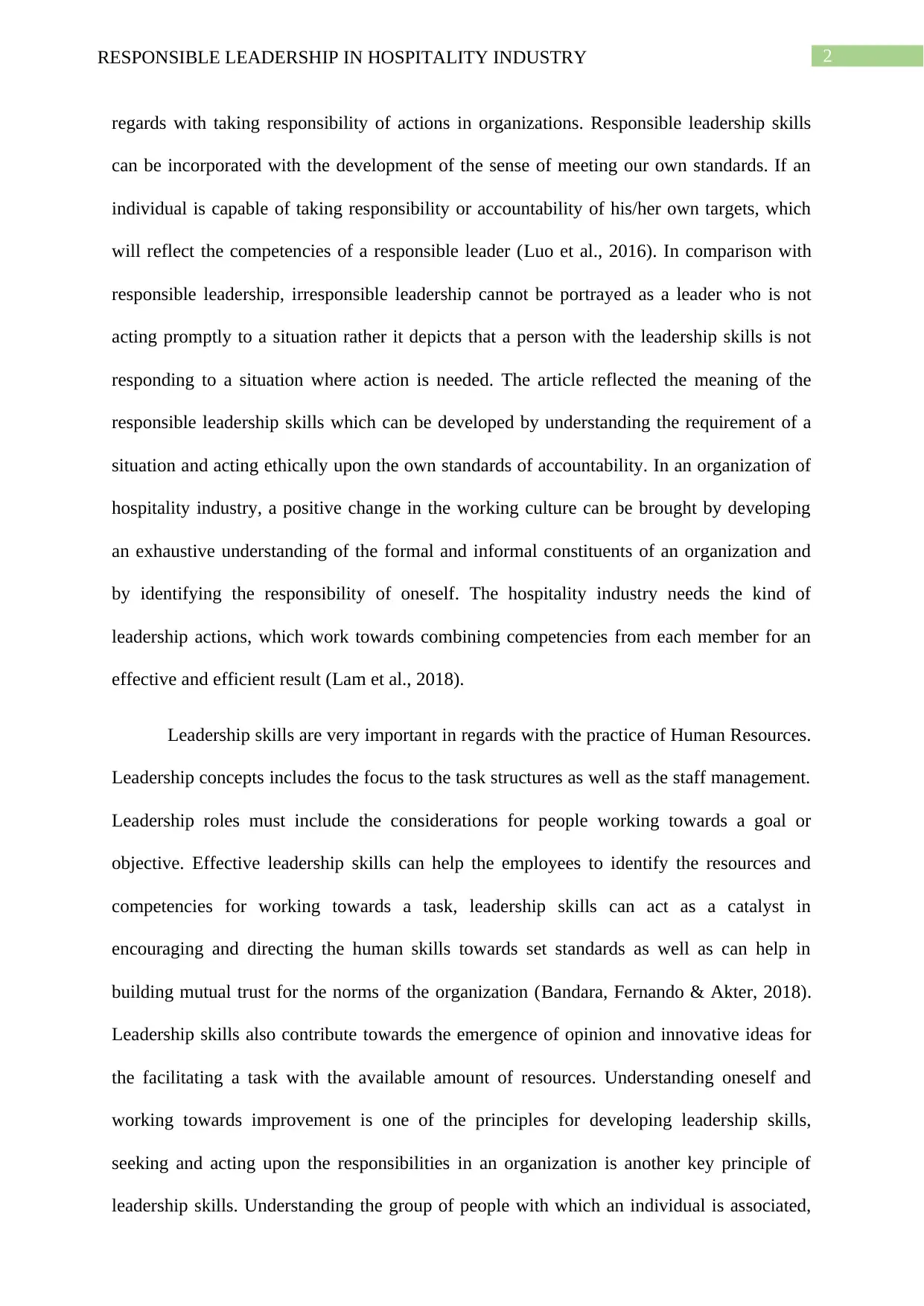
2RESPONSIBLE LEADERSHIP IN HOSPITALITY INDUSTRY
regards with taking responsibility of actions in organizations. Responsible leadership skills
can be incorporated with the development of the sense of meeting our own standards. If an
individual is capable of taking responsibility or accountability of his/her own targets, which
will reflect the competencies of a responsible leader (Luo et al., 2016). In comparison with
responsible leadership, irresponsible leadership cannot be portrayed as a leader who is not
acting promptly to a situation rather it depicts that a person with the leadership skills is not
responding to a situation where action is needed. The article reflected the meaning of the
responsible leadership skills which can be developed by understanding the requirement of a
situation and acting ethically upon the own standards of accountability. In an organization of
hospitality industry, a positive change in the working culture can be brought by developing
an exhaustive understanding of the formal and informal constituents of an organization and
by identifying the responsibility of oneself. The hospitality industry needs the kind of
leadership actions, which work towards combining competencies from each member for an
effective and efficient result (Lam et al., 2018).
Leadership skills are very important in regards with the practice of Human Resources.
Leadership concepts includes the focus to the task structures as well as the staff management.
Leadership roles must include the considerations for people working towards a goal or
objective. Effective leadership skills can help the employees to identify the resources and
competencies for working towards a task, leadership skills can act as a catalyst in
encouraging and directing the human skills towards set standards as well as can help in
building mutual trust for the norms of the organization (Bandara, Fernando & Akter, 2018).
Leadership skills also contribute towards the emergence of opinion and innovative ideas for
the facilitating a task with the available amount of resources. Understanding oneself and
working towards improvement is one of the principles for developing leadership skills,
seeking and acting upon the responsibilities in an organization is another key principle of
leadership skills. Understanding the group of people with which an individual is associated,
regards with taking responsibility of actions in organizations. Responsible leadership skills
can be incorporated with the development of the sense of meeting our own standards. If an
individual is capable of taking responsibility or accountability of his/her own targets, which
will reflect the competencies of a responsible leader (Luo et al., 2016). In comparison with
responsible leadership, irresponsible leadership cannot be portrayed as a leader who is not
acting promptly to a situation rather it depicts that a person with the leadership skills is not
responding to a situation where action is needed. The article reflected the meaning of the
responsible leadership skills which can be developed by understanding the requirement of a
situation and acting ethically upon the own standards of accountability. In an organization of
hospitality industry, a positive change in the working culture can be brought by developing
an exhaustive understanding of the formal and informal constituents of an organization and
by identifying the responsibility of oneself. The hospitality industry needs the kind of
leadership actions, which work towards combining competencies from each member for an
effective and efficient result (Lam et al., 2018).
Leadership skills are very important in regards with the practice of Human Resources.
Leadership concepts includes the focus to the task structures as well as the staff management.
Leadership roles must include the considerations for people working towards a goal or
objective. Effective leadership skills can help the employees to identify the resources and
competencies for working towards a task, leadership skills can act as a catalyst in
encouraging and directing the human skills towards set standards as well as can help in
building mutual trust for the norms of the organization (Bandara, Fernando & Akter, 2018).
Leadership skills also contribute towards the emergence of opinion and innovative ideas for
the facilitating a task with the available amount of resources. Understanding oneself and
working towards improvement is one of the principles for developing leadership skills,
seeking and acting upon the responsibilities in an organization is another key principle of
leadership skills. Understanding the group of people with which an individual is associated,
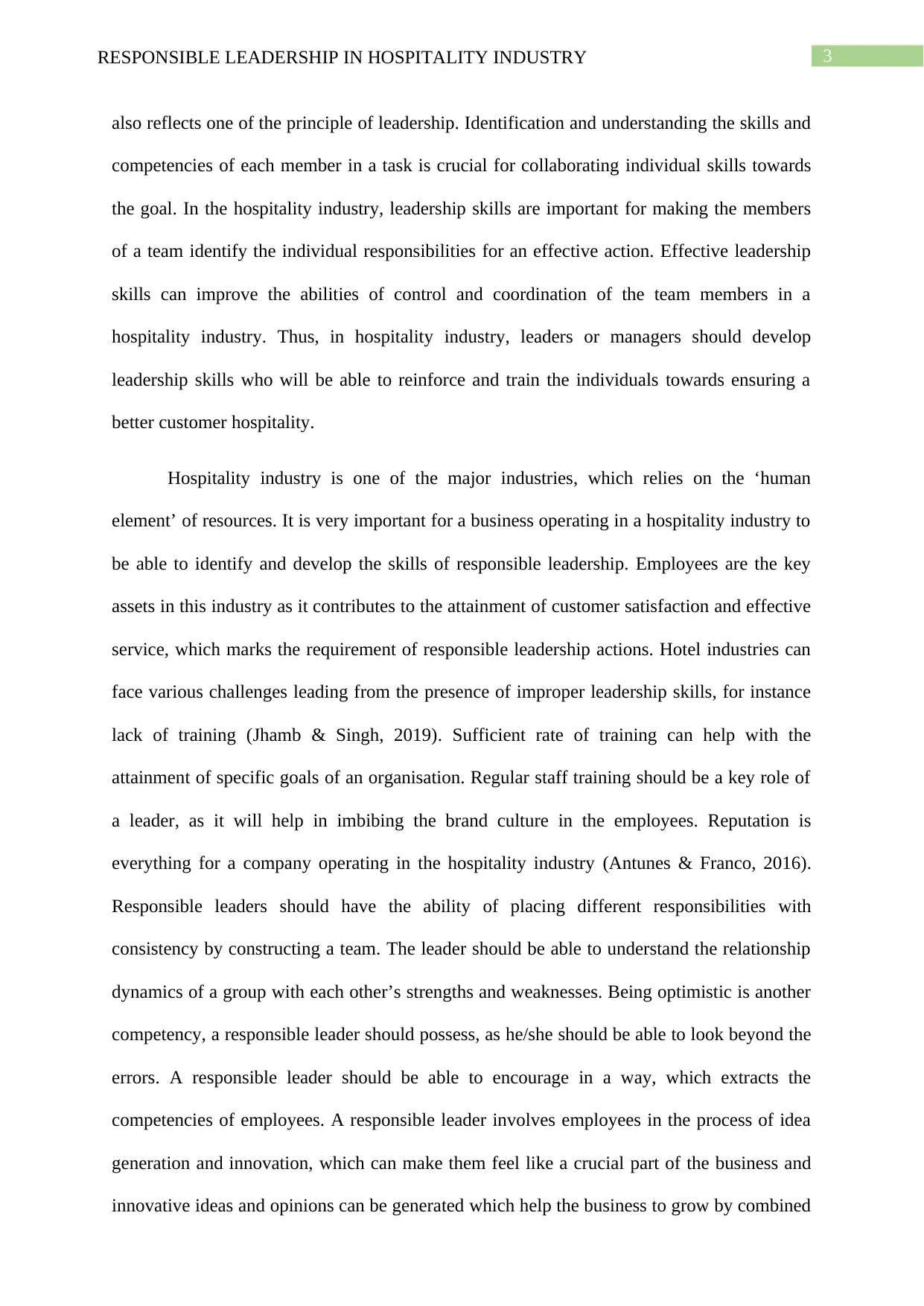
3RESPONSIBLE LEADERSHIP IN HOSPITALITY INDUSTRY
also reflects one of the principle of leadership. Identification and understanding the skills and
competencies of each member in a task is crucial for collaborating individual skills towards
the goal. In the hospitality industry, leadership skills are important for making the members
of a team identify the individual responsibilities for an effective action. Effective leadership
skills can improve the abilities of control and coordination of the team members in a
hospitality industry. Thus, in hospitality industry, leaders or managers should develop
leadership skills who will be able to reinforce and train the individuals towards ensuring a
better customer hospitality.
Hospitality industry is one of the major industries, which relies on the ‘human
element’ of resources. It is very important for a business operating in a hospitality industry to
be able to identify and develop the skills of responsible leadership. Employees are the key
assets in this industry as it contributes to the attainment of customer satisfaction and effective
service, which marks the requirement of responsible leadership actions. Hotel industries can
face various challenges leading from the presence of improper leadership skills, for instance
lack of training (Jhamb & Singh, 2019). Sufficient rate of training can help with the
attainment of specific goals of an organisation. Regular staff training should be a key role of
a leader, as it will help in imbibing the brand culture in the employees. Reputation is
everything for a company operating in the hospitality industry (Antunes & Franco, 2016).
Responsible leaders should have the ability of placing different responsibilities with
consistency by constructing a team. The leader should be able to understand the relationship
dynamics of a group with each other’s strengths and weaknesses. Being optimistic is another
competency, a responsible leader should possess, as he/she should be able to look beyond the
errors. A responsible leader should be able to encourage in a way, which extracts the
competencies of employees. A responsible leader involves employees in the process of idea
generation and innovation, which can make them feel like a crucial part of the business and
innovative ideas and opinions can be generated which help the business to grow by combined
also reflects one of the principle of leadership. Identification and understanding the skills and
competencies of each member in a task is crucial for collaborating individual skills towards
the goal. In the hospitality industry, leadership skills are important for making the members
of a team identify the individual responsibilities for an effective action. Effective leadership
skills can improve the abilities of control and coordination of the team members in a
hospitality industry. Thus, in hospitality industry, leaders or managers should develop
leadership skills who will be able to reinforce and train the individuals towards ensuring a
better customer hospitality.
Hospitality industry is one of the major industries, which relies on the ‘human
element’ of resources. It is very important for a business operating in a hospitality industry to
be able to identify and develop the skills of responsible leadership. Employees are the key
assets in this industry as it contributes to the attainment of customer satisfaction and effective
service, which marks the requirement of responsible leadership actions. Hotel industries can
face various challenges leading from the presence of improper leadership skills, for instance
lack of training (Jhamb & Singh, 2019). Sufficient rate of training can help with the
attainment of specific goals of an organisation. Regular staff training should be a key role of
a leader, as it will help in imbibing the brand culture in the employees. Reputation is
everything for a company operating in the hospitality industry (Antunes & Franco, 2016).
Responsible leaders should have the ability of placing different responsibilities with
consistency by constructing a team. The leader should be able to understand the relationship
dynamics of a group with each other’s strengths and weaknesses. Being optimistic is another
competency, a responsible leader should possess, as he/she should be able to look beyond the
errors. A responsible leader should be able to encourage in a way, which extracts the
competencies of employees. A responsible leader involves employees in the process of idea
generation and innovation, which can make them feel like a crucial part of the business and
innovative ideas and opinions can be generated which help the business to grow by combined
Secure Best Marks with AI Grader
Need help grading? Try our AI Grader for instant feedback on your assignments.
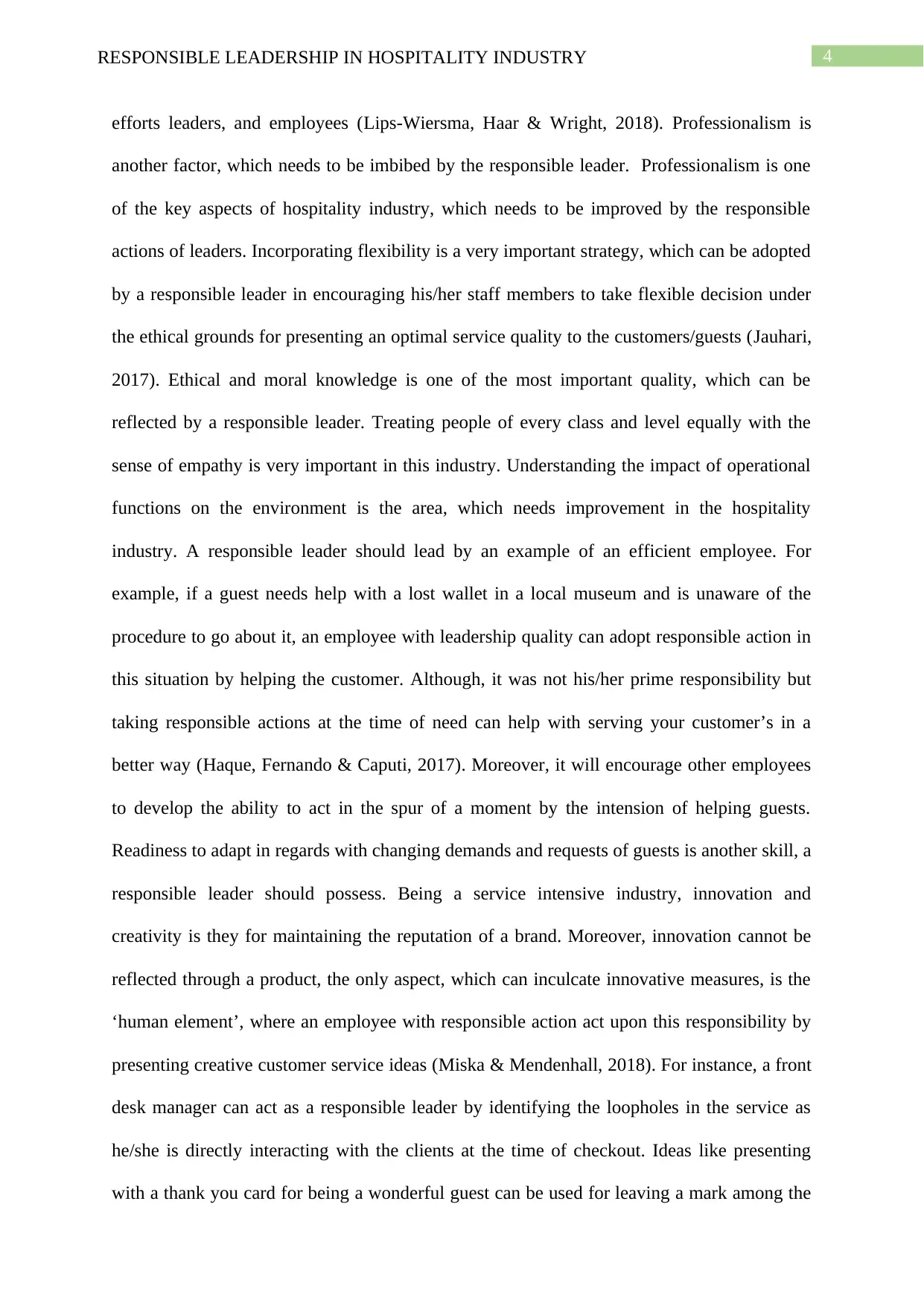
4RESPONSIBLE LEADERSHIP IN HOSPITALITY INDUSTRY
efforts leaders, and employees (Lips-Wiersma, Haar & Wright, 2018). Professionalism is
another factor, which needs to be imbibed by the responsible leader. Professionalism is one
of the key aspects of hospitality industry, which needs to be improved by the responsible
actions of leaders. Incorporating flexibility is a very important strategy, which can be adopted
by a responsible leader in encouraging his/her staff members to take flexible decision under
the ethical grounds for presenting an optimal service quality to the customers/guests (Jauhari,
2017). Ethical and moral knowledge is one of the most important quality, which can be
reflected by a responsible leader. Treating people of every class and level equally with the
sense of empathy is very important in this industry. Understanding the impact of operational
functions on the environment is the area, which needs improvement in the hospitality
industry. A responsible leader should lead by an example of an efficient employee. For
example, if a guest needs help with a lost wallet in a local museum and is unaware of the
procedure to go about it, an employee with leadership quality can adopt responsible action in
this situation by helping the customer. Although, it was not his/her prime responsibility but
taking responsible actions at the time of need can help with serving your customer’s in a
better way (Haque, Fernando & Caputi, 2017). Moreover, it will encourage other employees
to develop the ability to act in the spur of a moment by the intension of helping guests.
Readiness to adapt in regards with changing demands and requests of guests is another skill, a
responsible leader should possess. Being a service intensive industry, innovation and
creativity is they for maintaining the reputation of a brand. Moreover, innovation cannot be
reflected through a product, the only aspect, which can inculcate innovative measures, is the
‘human element’, where an employee with responsible action act upon this responsibility by
presenting creative customer service ideas (Miska & Mendenhall, 2018). For instance, a front
desk manager can act as a responsible leader by identifying the loopholes in the service as
he/she is directly interacting with the clients at the time of checkout. Ideas like presenting
with a thank you card for being a wonderful guest can be used for leaving a mark among the
efforts leaders, and employees (Lips-Wiersma, Haar & Wright, 2018). Professionalism is
another factor, which needs to be imbibed by the responsible leader. Professionalism is one
of the key aspects of hospitality industry, which needs to be improved by the responsible
actions of leaders. Incorporating flexibility is a very important strategy, which can be adopted
by a responsible leader in encouraging his/her staff members to take flexible decision under
the ethical grounds for presenting an optimal service quality to the customers/guests (Jauhari,
2017). Ethical and moral knowledge is one of the most important quality, which can be
reflected by a responsible leader. Treating people of every class and level equally with the
sense of empathy is very important in this industry. Understanding the impact of operational
functions on the environment is the area, which needs improvement in the hospitality
industry. A responsible leader should lead by an example of an efficient employee. For
example, if a guest needs help with a lost wallet in a local museum and is unaware of the
procedure to go about it, an employee with leadership quality can adopt responsible action in
this situation by helping the customer. Although, it was not his/her prime responsibility but
taking responsible actions at the time of need can help with serving your customer’s in a
better way (Haque, Fernando & Caputi, 2017). Moreover, it will encourage other employees
to develop the ability to act in the spur of a moment by the intension of helping guests.
Readiness to adapt in regards with changing demands and requests of guests is another skill, a
responsible leader should possess. Being a service intensive industry, innovation and
creativity is they for maintaining the reputation of a brand. Moreover, innovation cannot be
reflected through a product, the only aspect, which can inculcate innovative measures, is the
‘human element’, where an employee with responsible action act upon this responsibility by
presenting creative customer service ideas (Miska & Mendenhall, 2018). For instance, a front
desk manager can act as a responsible leader by identifying the loopholes in the service as
he/she is directly interacting with the clients at the time of checkout. Ideas like presenting
with a thank you card for being a wonderful guest can be used for leaving a mark among the
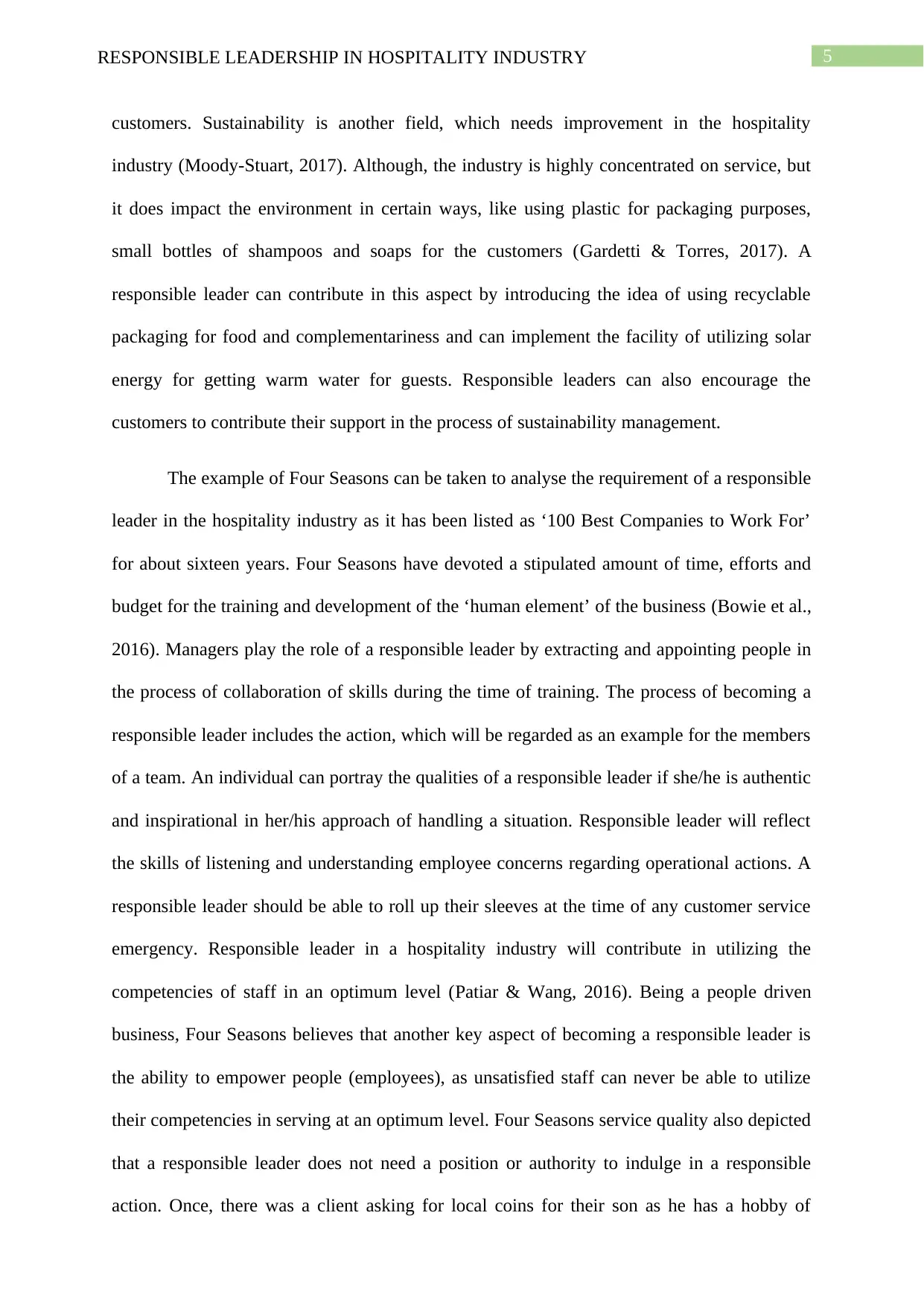
5RESPONSIBLE LEADERSHIP IN HOSPITALITY INDUSTRY
customers. Sustainability is another field, which needs improvement in the hospitality
industry (Moody-Stuart, 2017). Although, the industry is highly concentrated on service, but
it does impact the environment in certain ways, like using plastic for packaging purposes,
small bottles of shampoos and soaps for the customers (Gardetti & Torres, 2017). A
responsible leader can contribute in this aspect by introducing the idea of using recyclable
packaging for food and complementariness and can implement the facility of utilizing solar
energy for getting warm water for guests. Responsible leaders can also encourage the
customers to contribute their support in the process of sustainability management.
The example of Four Seasons can be taken to analyse the requirement of a responsible
leader in the hospitality industry as it has been listed as ‘100 Best Companies to Work For’
for about sixteen years. Four Seasons have devoted a stipulated amount of time, efforts and
budget for the training and development of the ‘human element’ of the business (Bowie et al.,
2016). Managers play the role of a responsible leader by extracting and appointing people in
the process of collaboration of skills during the time of training. The process of becoming a
responsible leader includes the action, which will be regarded as an example for the members
of a team. An individual can portray the qualities of a responsible leader if she/he is authentic
and inspirational in her/his approach of handling a situation. Responsible leader will reflect
the skills of listening and understanding employee concerns regarding operational actions. A
responsible leader should be able to roll up their sleeves at the time of any customer service
emergency. Responsible leader in a hospitality industry will contribute in utilizing the
competencies of staff in an optimum level (Patiar & Wang, 2016). Being a people driven
business, Four Seasons believes that another key aspect of becoming a responsible leader is
the ability to empower people (employees), as unsatisfied staff can never be able to utilize
their competencies in serving at an optimum level. Four Seasons service quality also depicted
that a responsible leader does not need a position or authority to indulge in a responsible
action. Once, there was a client asking for local coins for their son as he has a hobby of
customers. Sustainability is another field, which needs improvement in the hospitality
industry (Moody-Stuart, 2017). Although, the industry is highly concentrated on service, but
it does impact the environment in certain ways, like using plastic for packaging purposes,
small bottles of shampoos and soaps for the customers (Gardetti & Torres, 2017). A
responsible leader can contribute in this aspect by introducing the idea of using recyclable
packaging for food and complementariness and can implement the facility of utilizing solar
energy for getting warm water for guests. Responsible leaders can also encourage the
customers to contribute their support in the process of sustainability management.
The example of Four Seasons can be taken to analyse the requirement of a responsible
leader in the hospitality industry as it has been listed as ‘100 Best Companies to Work For’
for about sixteen years. Four Seasons have devoted a stipulated amount of time, efforts and
budget for the training and development of the ‘human element’ of the business (Bowie et al.,
2016). Managers play the role of a responsible leader by extracting and appointing people in
the process of collaboration of skills during the time of training. The process of becoming a
responsible leader includes the action, which will be regarded as an example for the members
of a team. An individual can portray the qualities of a responsible leader if she/he is authentic
and inspirational in her/his approach of handling a situation. Responsible leader will reflect
the skills of listening and understanding employee concerns regarding operational actions. A
responsible leader should be able to roll up their sleeves at the time of any customer service
emergency. Responsible leader in a hospitality industry will contribute in utilizing the
competencies of staff in an optimum level (Patiar & Wang, 2016). Being a people driven
business, Four Seasons believes that another key aspect of becoming a responsible leader is
the ability to empower people (employees), as unsatisfied staff can never be able to utilize
their competencies in serving at an optimum level. Four Seasons service quality also depicted
that a responsible leader does not need a position or authority to indulge in a responsible
action. Once, there was a client asking for local coins for their son as he has a hobby of
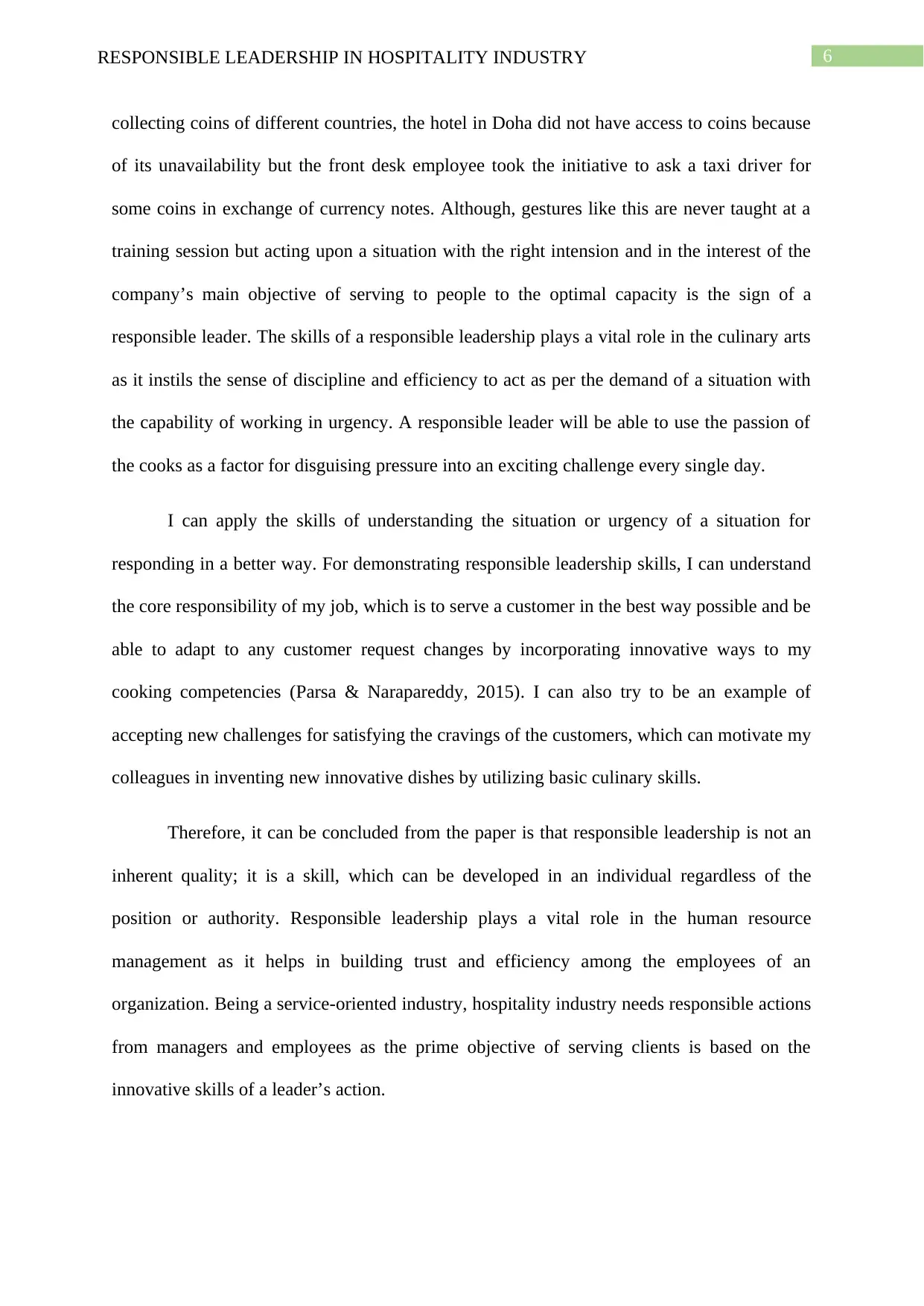
6RESPONSIBLE LEADERSHIP IN HOSPITALITY INDUSTRY
collecting coins of different countries, the hotel in Doha did not have access to coins because
of its unavailability but the front desk employee took the initiative to ask a taxi driver for
some coins in exchange of currency notes. Although, gestures like this are never taught at a
training session but acting upon a situation with the right intension and in the interest of the
company’s main objective of serving to people to the optimal capacity is the sign of a
responsible leader. The skills of a responsible leadership plays a vital role in the culinary arts
as it instils the sense of discipline and efficiency to act as per the demand of a situation with
the capability of working in urgency. A responsible leader will be able to use the passion of
the cooks as a factor for disguising pressure into an exciting challenge every single day.
I can apply the skills of understanding the situation or urgency of a situation for
responding in a better way. For demonstrating responsible leadership skills, I can understand
the core responsibility of my job, which is to serve a customer in the best way possible and be
able to adapt to any customer request changes by incorporating innovative ways to my
cooking competencies (Parsa & Narapareddy, 2015). I can also try to be an example of
accepting new challenges for satisfying the cravings of the customers, which can motivate my
colleagues in inventing new innovative dishes by utilizing basic culinary skills.
Therefore, it can be concluded from the paper is that responsible leadership is not an
inherent quality; it is a skill, which can be developed in an individual regardless of the
position or authority. Responsible leadership plays a vital role in the human resource
management as it helps in building trust and efficiency among the employees of an
organization. Being a service-oriented industry, hospitality industry needs responsible actions
from managers and employees as the prime objective of serving clients is based on the
innovative skills of a leader’s action.
collecting coins of different countries, the hotel in Doha did not have access to coins because
of its unavailability but the front desk employee took the initiative to ask a taxi driver for
some coins in exchange of currency notes. Although, gestures like this are never taught at a
training session but acting upon a situation with the right intension and in the interest of the
company’s main objective of serving to people to the optimal capacity is the sign of a
responsible leader. The skills of a responsible leadership plays a vital role in the culinary arts
as it instils the sense of discipline and efficiency to act as per the demand of a situation with
the capability of working in urgency. A responsible leader will be able to use the passion of
the cooks as a factor for disguising pressure into an exciting challenge every single day.
I can apply the skills of understanding the situation or urgency of a situation for
responding in a better way. For demonstrating responsible leadership skills, I can understand
the core responsibility of my job, which is to serve a customer in the best way possible and be
able to adapt to any customer request changes by incorporating innovative ways to my
cooking competencies (Parsa & Narapareddy, 2015). I can also try to be an example of
accepting new challenges for satisfying the cravings of the customers, which can motivate my
colleagues in inventing new innovative dishes by utilizing basic culinary skills.
Therefore, it can be concluded from the paper is that responsible leadership is not an
inherent quality; it is a skill, which can be developed in an individual regardless of the
position or authority. Responsible leadership plays a vital role in the human resource
management as it helps in building trust and efficiency among the employees of an
organization. Being a service-oriented industry, hospitality industry needs responsible actions
from managers and employees as the prime objective of serving clients is based on the
innovative skills of a leader’s action.
Paraphrase This Document
Need a fresh take? Get an instant paraphrase of this document with our AI Paraphraser
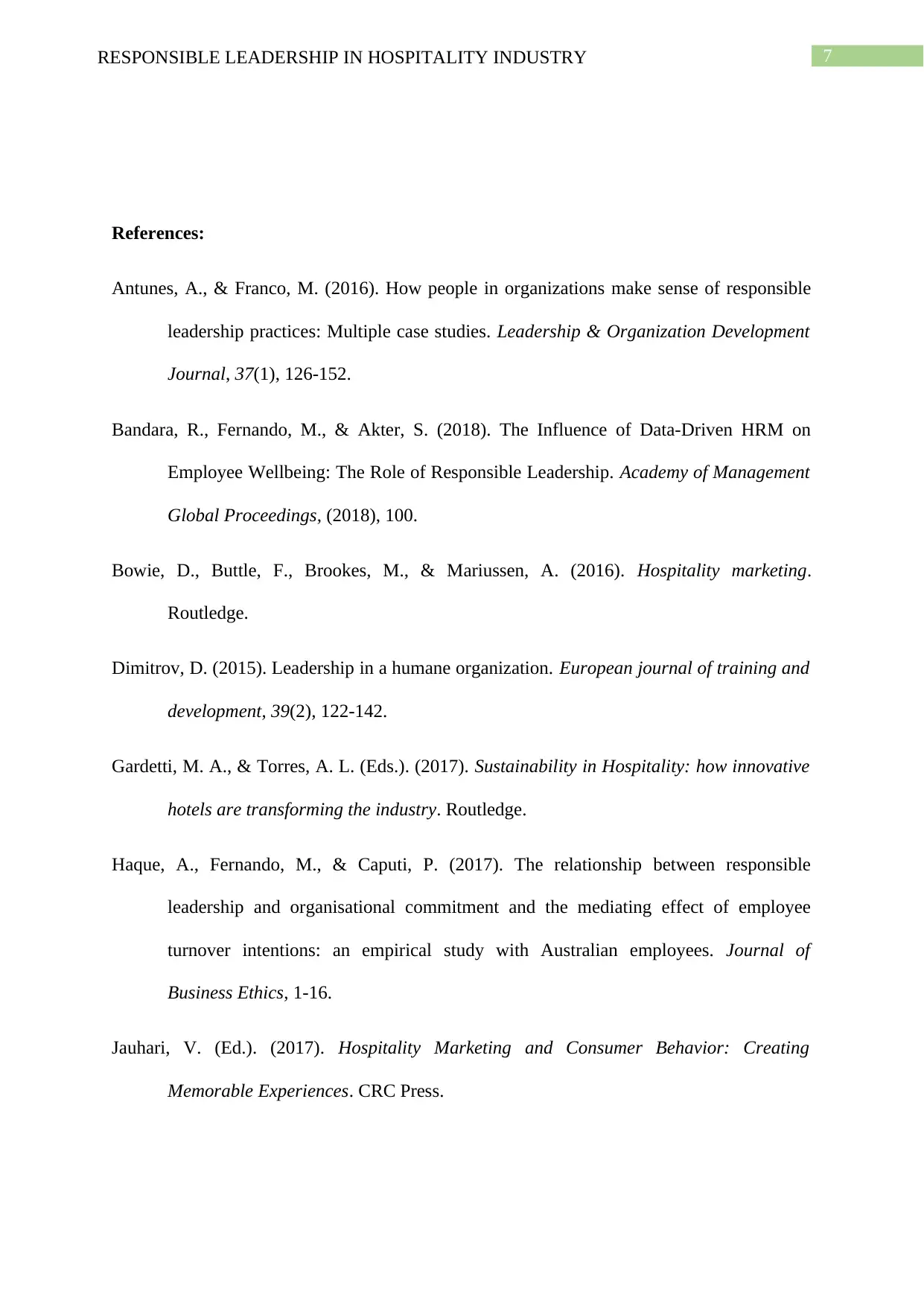
7RESPONSIBLE LEADERSHIP IN HOSPITALITY INDUSTRY
References:
Antunes, A., & Franco, M. (2016). How people in organizations make sense of responsible
leadership practices: Multiple case studies. Leadership & Organization Development
Journal, 37(1), 126-152.
Bandara, R., Fernando, M., & Akter, S. (2018). The Influence of Data-Driven HRM on
Employee Wellbeing: The Role of Responsible Leadership. Academy of Management
Global Proceedings, (2018), 100.
Bowie, D., Buttle, F., Brookes, M., & Mariussen, A. (2016). Hospitality marketing.
Routledge.
Dimitrov, D. (2015). Leadership in a humane organization. European journal of training and
development, 39(2), 122-142.
Gardetti, M. A., & Torres, A. L. (Eds.). (2017). Sustainability in Hospitality: how innovative
hotels are transforming the industry. Routledge.
Haque, A., Fernando, M., & Caputi, P. (2017). The relationship between responsible
leadership and organisational commitment and the mediating effect of employee
turnover intentions: an empirical study with Australian employees. Journal of
Business Ethics, 1-16.
Jauhari, V. (Ed.). (2017). Hospitality Marketing and Consumer Behavior: Creating
Memorable Experiences. CRC Press.
References:
Antunes, A., & Franco, M. (2016). How people in organizations make sense of responsible
leadership practices: Multiple case studies. Leadership & Organization Development
Journal, 37(1), 126-152.
Bandara, R., Fernando, M., & Akter, S. (2018). The Influence of Data-Driven HRM on
Employee Wellbeing: The Role of Responsible Leadership. Academy of Management
Global Proceedings, (2018), 100.
Bowie, D., Buttle, F., Brookes, M., & Mariussen, A. (2016). Hospitality marketing.
Routledge.
Dimitrov, D. (2015). Leadership in a humane organization. European journal of training and
development, 39(2), 122-142.
Gardetti, M. A., & Torres, A. L. (Eds.). (2017). Sustainability in Hospitality: how innovative
hotels are transforming the industry. Routledge.
Haque, A., Fernando, M., & Caputi, P. (2017). The relationship between responsible
leadership and organisational commitment and the mediating effect of employee
turnover intentions: an empirical study with Australian employees. Journal of
Business Ethics, 1-16.
Jauhari, V. (Ed.). (2017). Hospitality Marketing and Consumer Behavior: Creating
Memorable Experiences. CRC Press.
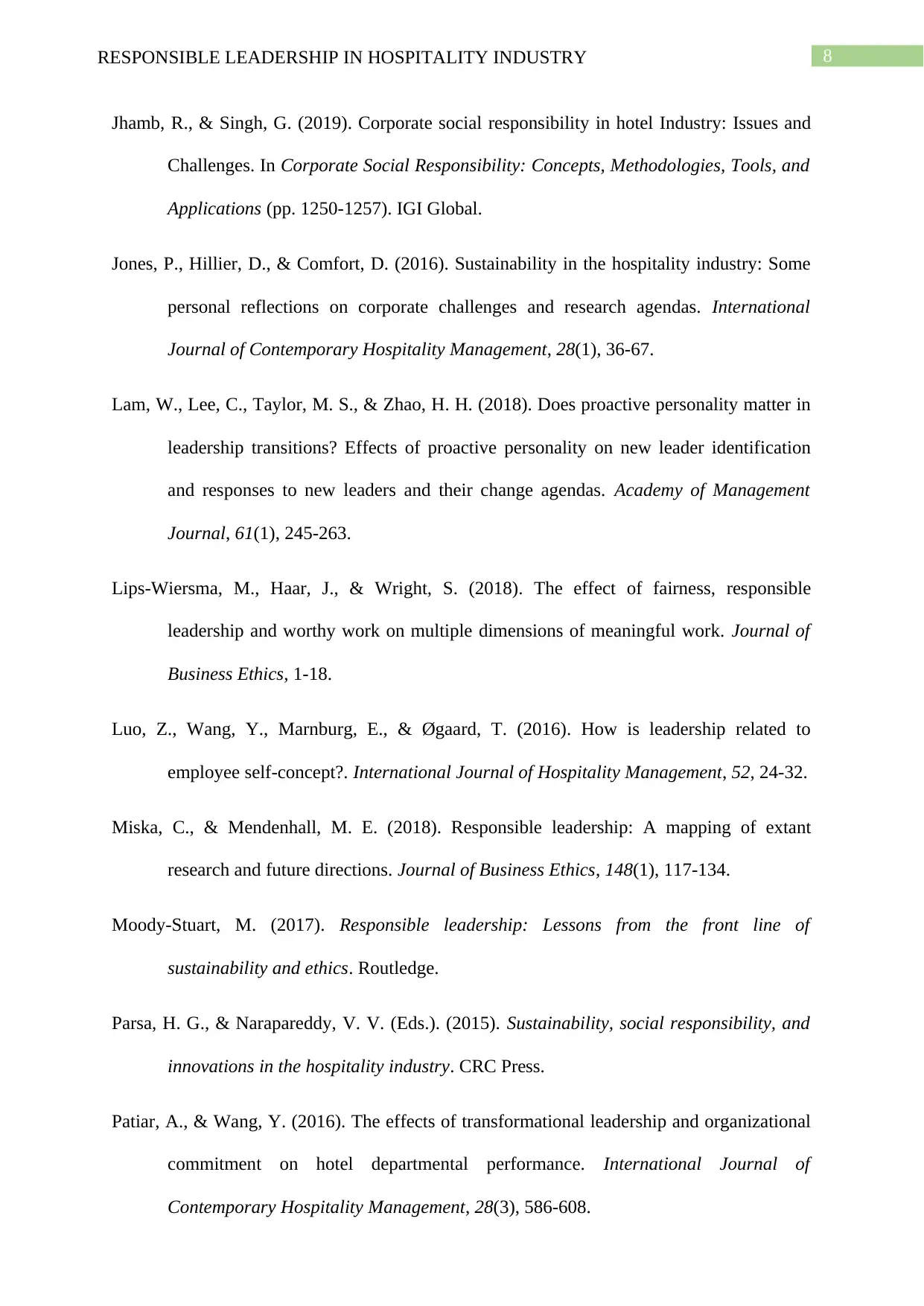
8RESPONSIBLE LEADERSHIP IN HOSPITALITY INDUSTRY
Jhamb, R., & Singh, G. (2019). Corporate social responsibility in hotel Industry: Issues and
Challenges. In Corporate Social Responsibility: Concepts, Methodologies, Tools, and
Applications (pp. 1250-1257). IGI Global.
Jones, P., Hillier, D., & Comfort, D. (2016). Sustainability in the hospitality industry: Some
personal reflections on corporate challenges and research agendas. International
Journal of Contemporary Hospitality Management, 28(1), 36-67.
Lam, W., Lee, C., Taylor, M. S., & Zhao, H. H. (2018). Does proactive personality matter in
leadership transitions? Effects of proactive personality on new leader identification
and responses to new leaders and their change agendas. Academy of Management
Journal, 61(1), 245-263.
Lips-Wiersma, M., Haar, J., & Wright, S. (2018). The effect of fairness, responsible
leadership and worthy work on multiple dimensions of meaningful work. Journal of
Business Ethics, 1-18.
Luo, Z., Wang, Y., Marnburg, E., & Øgaard, T. (2016). How is leadership related to
employee self-concept?. International Journal of Hospitality Management, 52, 24-32.
Miska, C., & Mendenhall, M. E. (2018). Responsible leadership: A mapping of extant
research and future directions. Journal of Business Ethics, 148(1), 117-134.
Moody-Stuart, M. (2017). Responsible leadership: Lessons from the front line of
sustainability and ethics. Routledge.
Parsa, H. G., & Narapareddy, V. V. (Eds.). (2015). Sustainability, social responsibility, and
innovations in the hospitality industry. CRC Press.
Patiar, A., & Wang, Y. (2016). The effects of transformational leadership and organizational
commitment on hotel departmental performance. International Journal of
Contemporary Hospitality Management, 28(3), 586-608.
Jhamb, R., & Singh, G. (2019). Corporate social responsibility in hotel Industry: Issues and
Challenges. In Corporate Social Responsibility: Concepts, Methodologies, Tools, and
Applications (pp. 1250-1257). IGI Global.
Jones, P., Hillier, D., & Comfort, D. (2016). Sustainability in the hospitality industry: Some
personal reflections on corporate challenges and research agendas. International
Journal of Contemporary Hospitality Management, 28(1), 36-67.
Lam, W., Lee, C., Taylor, M. S., & Zhao, H. H. (2018). Does proactive personality matter in
leadership transitions? Effects of proactive personality on new leader identification
and responses to new leaders and their change agendas. Academy of Management
Journal, 61(1), 245-263.
Lips-Wiersma, M., Haar, J., & Wright, S. (2018). The effect of fairness, responsible
leadership and worthy work on multiple dimensions of meaningful work. Journal of
Business Ethics, 1-18.
Luo, Z., Wang, Y., Marnburg, E., & Øgaard, T. (2016). How is leadership related to
employee self-concept?. International Journal of Hospitality Management, 52, 24-32.
Miska, C., & Mendenhall, M. E. (2018). Responsible leadership: A mapping of extant
research and future directions. Journal of Business Ethics, 148(1), 117-134.
Moody-Stuart, M. (2017). Responsible leadership: Lessons from the front line of
sustainability and ethics. Routledge.
Parsa, H. G., & Narapareddy, V. V. (Eds.). (2015). Sustainability, social responsibility, and
innovations in the hospitality industry. CRC Press.
Patiar, A., & Wang, Y. (2016). The effects of transformational leadership and organizational
commitment on hotel departmental performance. International Journal of
Contemporary Hospitality Management, 28(3), 586-608.
1 out of 9
Related Documents
Your All-in-One AI-Powered Toolkit for Academic Success.
+13062052269
info@desklib.com
Available 24*7 on WhatsApp / Email
![[object Object]](/_next/static/media/star-bottom.7253800d.svg)
Unlock your academic potential
© 2024 | Zucol Services PVT LTD | All rights reserved.





